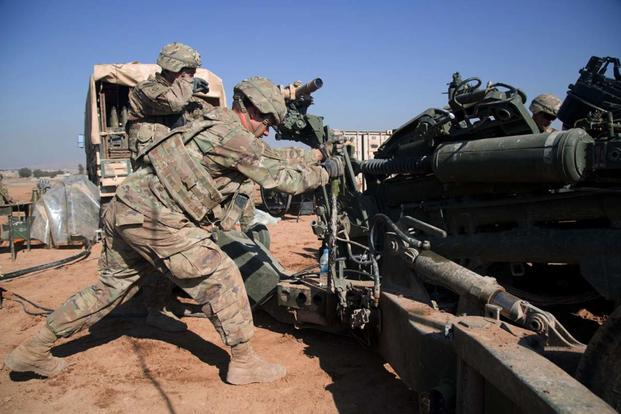Defense Secretary Jim Mattis said Thursday he wants to consult with allies before considering putting U.S. ground combat troops into Syria and Iraq to speed up the campaign against the Islamic State of Iraq and Syria.
Mattis did not rule out the possibility but said, "I first want to talk to the other allies and we'll decide where we're going."
Without input from the allies, Mattis said he is not "comfortable answering on my own at this point" on the issue of recommending to President Donald Trump that the U.S. commit conventional forces to Syria and Iraq.
The consultations with Mideast allies are likely to begin this weekend following a security conference in Germany on Friday, Mattis said at a news conference at NATO headquarters in Brussels.
"I'm going to fly from here into the Middle East," he said. "Once we know what we have in a mutual appreciation of the situation, then we'll go forward."
Mattis was responding to questions on a possible option, first reported by CNN, being considered by the Pentagon to send ground troops into Syria. That option could be included in the plan to defeat ISIS that Trump directed Mattis to draw up within 30 days in an executive order signed Jan. 27.
Trump has also speculated on the possibility of having the U.S. and Russian militaries coordinate efforts against ISIS in Syria, but Mattis said Thursday that Russia would have to "prove itself first" before joint military action could be feasible, The Washington Post reported.
Mattis spoke after leading a defense ministers meeting at NATO headquarters in Brussels on speeding up the anti-ISIS campaign.
He told defense reporters traveling with him, "We are not in a position right now to collaborate on a military level, but our political leaders will engage and try to find common ground or a way forward so that Russia, living up to its commitment, can return to a partnership of sorts here with NATO."
The U.S. and Russian militaries essentially broke off contacts in 2014 after Russia annexed Crimea and began supporting separatists in eastern Ukraine.
However, Joint Chiefs Chairman Gen. Joseph Dunford was in Azerbaijan on Thursday to meet with his Russian counterpart, Gen. Valery Gerasimov, for the first face-to-face talks between the military leaders of the two countries since 2014.
The CNN report that the Pentagon could be within weeks of announcing additional deployments of U.S. conventional troops to Syria came amid accounts from field commanders of increasing success against ISIS under the current strategy.
The Iraqi Security Forces recently liberated eastern Mosul, the last remaining major stronghold of ISIS in Iraq, and are preparing assaults into western Mosul.
In Syria, a combined Syrian Arab and Syrian Kurdish force under the banner of the Syrian Democratic Forces is making a steady advance against northeastern Raqqa, considered the ISIS capital.
Last week, Army Lt. Gen. Stephen Townsend, commander of Combined Joint Task Force-Operation Inherent Resolve, said he expects Raqqa and Mosul to be cleared of ISIS "within six months."
However, CNN cited a defense official as saying, "It's possible that you may see conventional forces hit the ground in Syria for some period of time."
Currently, there are about 5,000 U.S. troops in Iraq, mostly in a train, advise and assist role for local forces, and about 500 in Syria, mostly special operations troops who are also in a train, advise and assist role.
The prospect of sending more U.S. troops into Syria raises the question of what their mission would be in a battlefield complicated by Syria's civil war and recent movements by the forces of Syrian President Bashar al-Assad, backed by Russia, closer to areas where U.S.-supported rebel forces are operating.
A possible mission for additional U.S. troops would be to police so-called "safe zones" for refugees, a long-standing proposal of Turkey.
Trump has said previously that he would "absolutely do safe zones in Syria" as president, but Assad has rejected the idea.
-- Richard Sisk can be reached at Richard.Sisk@Military.com.



























